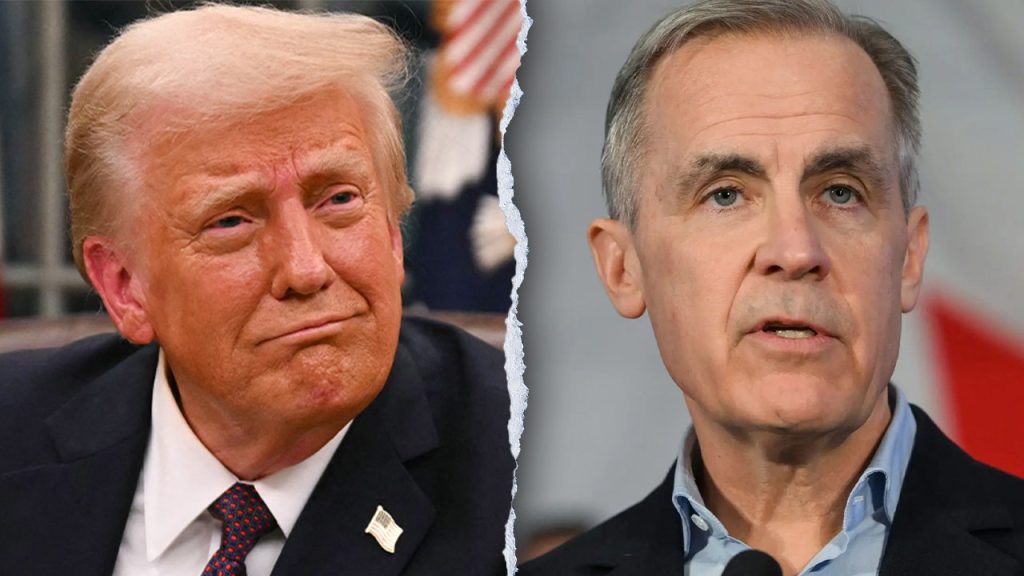In a recent press conference held in the Oval Office, former President Donald Trump stirred controversy by referring to Canada as the “51st state” of the United States. Trump’s remarks sparked questions about Canada’s political landscape and potential alignment with U.S. politics. During the conference, Trump characterized the U.S.-Canada border as an “artificial line,” further fueling debates about trade relationships and national identity.
| Article Subheadings |
|---|
| 1) Trump’s Comments on Canada as the “51st State” |
| 2) Significance of the U.S.-Canada Border Commentary |
| 3) Reactions and Impact on U.S.-Canada Relations |
| 4) Political Dynamics in Canada Following the Transition of Leadership |
| 5) Implications of Trade Policies and Tariffs |
Trump’s Comments on Canada as the “51st State”
During a press conference, Donald Trump spoke about Canada, labeling the border as an “artificial line.” This remark came during a session dominated by questions from reporters, notably Peter Doocy. When asked whether he felt concerned that Canada might lean politically to the left if it were a U.S. state, Trump emphasized, “I don’t care who winds up there,” hinting at the complexity of Canadian politics and how they may differ from American sentiments. Trump’s provocative statement of Canada as the “51st state” reflects his unconventional view on international relations and borders, often blurring the lines between nations in his rhetoric.
Significance of the U.S.-Canada Border Commentary
The remarks on the U.S.-Canada border being an “artificial line” have invoked discussions around national identity and the historical context of U.S.-Canadian relations. Trump described Canada as part of a larger, more beautiful landmass that was arbitrarily separated. This analogy raises questions about the nature of national boundaries and challenges traditional notions of sovereignty. Experts suggest that such comments can have reverberating effects on diplomatic ties, raising awareness about the nuanced and often fraught relationship between the two neighbors.
Reactions and Impact on U.S.-Canada Relations
The comments have not gone unnoticed in Canada, with reactions ranging from amusement to serious concern. Canadian MP Charlie Angus referred to Trump’s characterizations as an “act of war,” highlighting the contentious feelings many Canadians harbor regarding Trump’s approach to policy and diplomacy. The phrase “51st state” reflects a sense of perceived disregard, complicating the already sensitive issues related to tariffs and trade agreements. This raises the question of how such statements impact not only political relations but also the cultural exchange and public perception between the two countries.
Political Dynamics in Canada Following the Transition of Leadership
In the backdrop of Trump’s comments, political dynamics in Canada are shifting following the resignation of former Prime Minister Justin Trudeau and the subsequent rise of Mark Carney, the new leader of the Liberal Party. Carney’s win marks a significant transition in Canadian politics, as he aims to distance the party from controversies linked to Trudeau’s administration. Trump’s remarks on the Canadian leadership further complicate the political landscape, as varying opinions on his influence and the potential alignment with Carney emerge amidst both supportive and critical reactions from politicians and citizens alike.
Implications of Trade Policies and Tariffs
Trump’s administration imposed a 25% tariff on all imports of steel and aluminum from various countries, which significantly included Canada. The timing of the tariffs coincides with a period of heightened tension in U.S.-Canada trade relations. Beginning April 2, Canadian goods face a similar 25% tax on imports, which has galvanized protests and calls for a boycott among Canadian citizens. As both nations navigate these complex economic circumstances, Trump’s candid comments about Canada as a state amplify the potential repercussions of his trade policies, leading to a deeper examination of future economic collaboration and its challenges.
| No. | Key Points |
|---|---|
| 1 | Trump referred to Canada as the “51st state” during a recent press conference. |
| 2 | His remarks have raised questions about the U.S.-Canada border and its significance. |
| 3 | Canadian leaders have reacted strongly to Trump’s comments, accusing them of being dismissive. |
| 4 | The political landscape in Canada is shifting with new leadership under Mark Carney. |
| 5 | Trump’s trade tariffs have further strained relations between the U.S. and Canada. |
Summary
The recent pronouncements by former President Donald Trump regarding Canada as the “51st state” may serve as a catalyst for ongoing issues related to national identity, political alignment, and trade. With shifting political dynamics in Canada and direct ramifications stemming from Trump’s administration’s tariff policies, the foundation of U.S.-Canada relations is poised for further scrutiny and potential realignment. This incident underscores the intricate web of diplomacy, economics, and public sentiment that defines the bilateral relationship.
Frequently Asked Questions
Question: What were Trump’s comments about Canada during the press conference?
Trump referred to Canada as the “51st state,” describing the border as an “artificial line” and emphasizing the beauty of the landmass.
Question: Why did Canadian officials react strongly to Trump’s statements?
Canadian officials, including MP Charlie Angus, labeled Trump’s comments as an “act of war,” indicating a severe misinterpretation of Canada’s political sovereignty and identity.
Question: How have Trump’s trade tariffs impacted Canada?
Trump’s tariffs, particularly a 25% tax on imports of aluminum and steel, have strained economic relations, prompting protests and calls for boycotts among Canadians.


